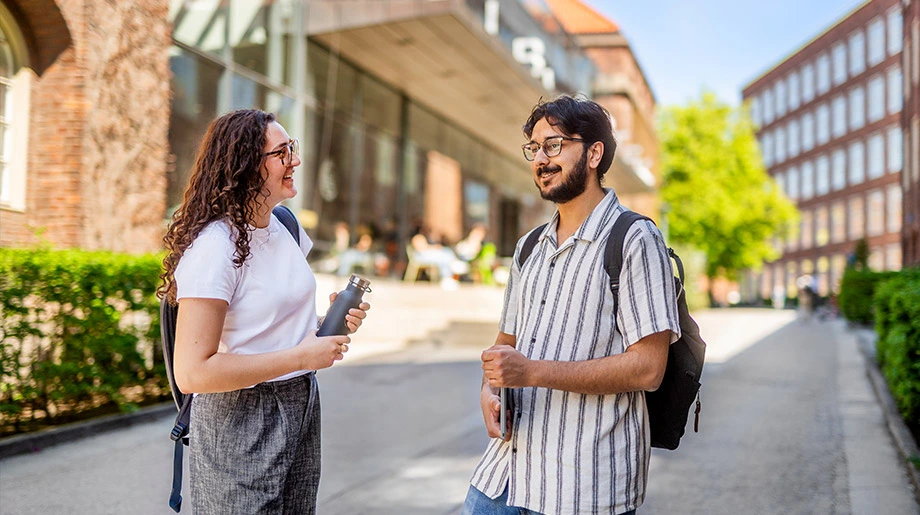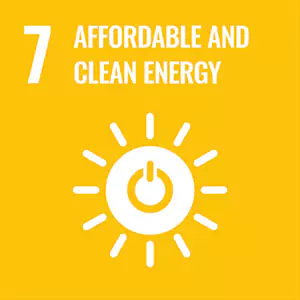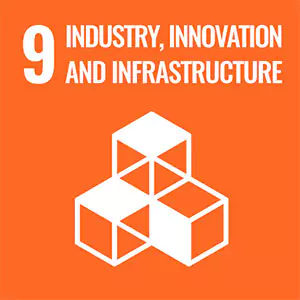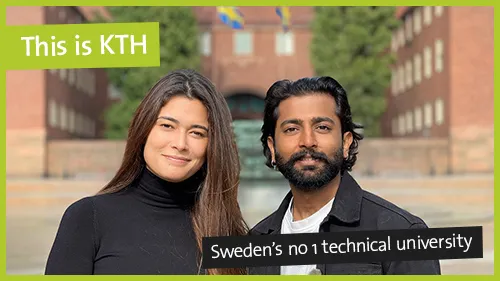MSc Sustainable Energy Engineering
The master's programme in Sustainable Energy Engineering provides advanced education in solar energy, power generation, energy utilisation and transformation of energy systems. Students gain a multidisciplinary foundation in energy engineering and skills to manage complex energy-related problems with a lifecycle perspective. Graduates lead the development in the energy sector with skills and insights in industrial challenges, leadership, innovation and entrepreneurship.

Sustainable Energy Engineering at KTH
The master's programme in Sustainable Energy Engineering equips you with skills and insights into leadership, industrial challenges, innovation and entrepreneurship in the energy field. The programme provides an atmosphere and learning environment that fosters global responsibilities and sustainable development. Therefore, the emphasis is placed on dealing with energy engineering tasks with due consideration of technical, environmental and socio-economic issues for applications especially in Sweden, but as all over the globe as well.
The first semester is dedicated to an intensive introductory period with broad-based coursework in energy engineering, including conversion technologies, systems and applications. You will take advanced-level energy engineering courses where you will put your pre-requisite knowledge in thermodynamics, fluid mechanics, and heat transfer to use in challenge-based problem-solving. Advanced methods are applied to identify, describe, quantify and find solutions to various energy engineering problems. For example, one of our courses allows you to tackle energy challenges for future cities with several interested parties and multiple optimisation criteria. You will get to work with a real city somewhere in the world to model and simulate energy systems at the district and city level. In the spring semester of 2025, the project aimed at developing energy systems in the Rwandan capital of Kigali.
For the second semester, you choose one of three profiles for in-depth studies for the rest of the programme.
Energy Supply through Clean Conversion Technologies
The profile Energy Supply through Clean Conversion Technologies focuses on sustainable energy conversion processes and systems for generating and distributing electrical power, district heating and cooling, and water treatment to drinking water quality. Within this profile, we also address turbomachinery development and applications and sustainable energy solutions for transportation. We cover the evolution of conventional energy systems to integrate a growing share of renewables and the challenges demanding further evaluation and innovation towards broader electrification, energy storage, efficient co-generation, polygeneration, transmission and improved solutions for energy supply-side management.
Energy in Buildings and Cities
More than 70 per cent of the world and European population live in urban areas. Energy systems in buildings and cities play a pivotal role in driving economic growth, ensuring the well-being of citizens, and mitigating the environmental impact of unprecedented urbanisation at the global level. The SEE profile "Energy in Buildings and Cities" focuses on the engineering challenges and opportunities for energy systems in the current and future urban areas.
The future energy engineers and managers must be able to analyse the complex energy systems at the district/city level. However, an impactful analysis of energy systems at the district/city level is hard to achieve without going through the complexity of the system components and proper understanding of the behaviour of the various energy technologies. Therefore, this profile has been designed to provide an adequate knowledge of urban energy systems at both technology and district/city levels.
The profile guides students through a comprehensive learning journey in three distinct phases: initially offering a macro-level overview of energy systems in buildings and cities, it subsequently delves deeply into crucial energy technologies, imparting technology-level engineering knowledge. Once students have gained a solid understanding of energy technologies such as heat pumps, district heating, and solar technologies, they return to system analysis and system integration with enhanced proficiency, enabling them to engineer and manage systems more effectively, considering both technical and economic perspectives.
Energy System Analysis
The profile Energy System Analysis focuses on the systems perspective of the sustainable energy transition, where energy technology innovation, planning, and policy are linked to sustainable development. You will learn how to develop quantitative models for analysing energy systems as the basis for strategic investment decisions and policy in the circular economy context. Through qualitative analyses, the impact of policies on the transition to a sustainable society is analysed. Central to this profile is the knowledge and skills necessary for contributing to a secure and low-carbon energy sector at the local, national, and international levels – and in harmony with the Sustainable Development Goals.
Courses and teaching methods
We offer courses by faculty staff who are also engaged in research and collaboration with the industry. Similarly, many courses employ professionals from the industry as guest lecturers on topics related to the practical side of the curriculum, including external experts to train the students on their communication skills. Examples of external partnerships in 2024-2025 are Svenska Kraftnät, Siemens, Electrolux, Abengoa, NoviOcean, Merlin and Metis, Greenly, Scania, Torresol, Sweco, Ellevio, Stockholm Exergi, Vattenfall, Fortum, World Bank and the International Energy Agency, Stockholm Resiliance Centre and Stockholm Environment Institute. The connection to Swedish companies, utilities, and authorities is an invaluable asset to the programme since many such organizations are forerunners in providing sustainable technology and solutions and implementing them. Witin KTH, our faculty is also engaged in KTH Climate action Centre, KTH Live-in lab and Dig-IT Lab.
KTH is a member of Unite, a network of seven top universities in seven European countries. Unite offers virtual and real-life exchange studies in energy technology, which allows students in the programme to follow several online and blended courses as a complement to the courses at KTH. These courses will be included in your degree from KTH.
Teaching in the programme is student-centred and hands-on, with a strong focus on challenge-driven and project-based learning. Digital learning formats are common, such as flipped classrooms, video lectures, and automatically corrected quizzes and exams. Students also gain extensive experience with professional software tools. During 2024/2025, one of the most appreciated tools has been IDA ICE, used for indoor climate and energy simulations. Other software includes Aspen Plus for process simulation, and several Python-based packages:
-
Pandapower for electric grid modelling and analysis,
-
Pyomo and pulp for system optimisation,
-
DHNX for district heating network analysis,
-
and machine-learning libraries for data analysis in energy technology.
For long-term planning, students use OSeMOSYS, an open-source modelling system for integrated energy assessment, and OnSSET, a GIS-based optimisation tool for electrification planning.
Degree project
During the final semester, you complete a degree project for five months. The project is done in an industrial or academic environment (for example, closely connected to research projects at the Department of Energy Technology). During your degree project, you will establish an excellent platform and gain valuable experience and contacts for the career ahead.
The master's programme in Sustainable Energy Engineering is a two-year programme (120 ECTS credits) given in English. Graduates are awarded the degree of Master of Science. The programme is given mainly at KTH Campus in Stockholm by KTH’s School of Industrial Engineering and Management.
Specialise in electric mobility
A transition to more sustainable transportation is an important part of the sustainability challenges. KTH offers a wide variety of courses in the field of electric mobility, spread across different programmes and departments. You can create an electric mobility course package by selecting some of these courses as electives within your programme. As electric mobility represents a key paradigm shift currently taking place in society, adding this profile to your studies could be a valuable enhancement to your CV.
Courses in the programme
The courses in the programme cover topics such as renewable energy, sustainable energy utilisation, sustainable power generation, energy policy, energy management, project management, state-of-the-art in sustainable energy technology, modelling of energy systems, energy technologies for sustainable transportation and AI applications in sustainable energy applications.
Courses in the master's programme in Sustainable Energy Engineering
Future and career
The energy field is an international and dynamic area in which well-trained engineers are in constant demand. Graduates find employment in industry, government agencies and consultancies. The master's programme in Sustainable Energy Engineering is also an excellent starting point for a research career as doctoral candidate either at KTH itself or other European universities.
After completing the programme, you can manage technical problems from a systems perspective, with a holistic view of their life cycle, from concept to specification, development, operation and decommissioning. You will also be confident in characterising an energy challenge, determining the necessary resource consumption and managing processes for problem-solving/realisation. During your studies, you will gain a particularly good understanding of the fact that engineering problems are often complex and sometimes involve conflicting conditions. You will become aware of the responsibilities and ethical standpoints that may arise in connection with various technical, organisational, economic, ecological and societal activities.
Thus, the programme prepares you for immediate engagement in developing and implementing sustainable energy technology, leadership positions in the field, and academic research. The future is bright, and, with properly trained engineers, society will reach sustainability in energy systems. Graduates from the programme can be among else be found in entrepreneurial companies like Vattenfall and Phoenix Biopower, in manufacturing companies like ABB and Scania, in consulting companies like AFRY, SWECO, WSP, McKinsey & Company and Alight. Or in energy utilities such as Söder Energi, Vattenfall and EDF, Ellevio. The can also be found in construction companies like NCC and Skanska, and other organisations such as and Swedish Energy Agency, IRENA, World Bank and the International Energy Agency. Graduates can work as, for example, energy systems analysts, sustainable energy consultants, project engineers in renewable energy, energy policy advisors or grid integration engineers.
Many graduates from the programme go on to PhD studies at KTH or Swedish universities such as Chalmers University of Technology, Lund University, Mälardalen University, Linnaeus University, Mid Sweden University and Dutch universities such as TU Eindhoven and TU Delft.
Sustainable development
Graduates from KTH have the knowledge and tools for moving society in a more sustainable direction, as sustainable development is an integral part of all programmes. Four key sustainable development goals addressed by the master's programme in Sustainable Energy Engineering are:



SDG7 (Affordable and Clean Energy) is addressed in many courses in the programme, such as "Renewable Energy Technology", "Sustainable Power Generation", and "Applied Heat and Power Technology", where technologies and tools for sustainable energy conversion are studied. To address SDG9 (Industry, Innovation and Infrastructure) the programme offers courses such as "Energy System Economics, Modelling and Indicators for Sustainable Energy Development" and "Applications and Transformation in Energy Policy and Climate Agenda". Programme courses that address SDG11 (Sustainable Cities and Communities) include "Energy in the Built Environment", "Energy Demand and Supply Distribution Systems in the Built Environment" and "Energy Systems for Smart Cities". The programme is closely connected with KTH’s Climate Action Centre., with teachers who share their time between working at the Centre and teaching courses within the programme. The programme also has courses that directly tackle circular economy and life cycle assessment, as well as courses focusing on sustainable use of land, water, and climate.
Faculty and research
The master's programme in Sustainable Energy Engineering is closely connected to the KTH Department of Energy Technology (EGI). At EGI, the research covers broad areas of energy conversion, electricity generation and energy utilisation, as well as energy systems and policies for implementing sustainable energy solutions. As such, the work aims to contribute to welfare and development through world-class research and education in innovative energy technologies and systems, and promote the energy sector transition towards sustainability.






